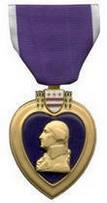

|
|
 Art Johnson
Art Johnson
Date and Place of Birth: July 16, 1919 Winchester, Massachusetts
Died: April 27, 2008 Holden, Massachuestts
Baseball
Experience:
Major League
Position:
Pitcher
Rank:
Yeoman
Military Unit:
US Navy
Area Served: Pacific Theater of Operations
 Arthur H “Art” Johnson was
born on July 16, 1916 in
Arthur H “Art” Johnson was
born on July 16, 1916 in
Johnson actually signed with the Braves during his junior year but never told anyone so he could pitch for his school team one more season without being declared ineligible.
In June 1938, the day after graduation, Johnson
was sent by the Braves to
His fine year with
"I'd always dreamed of playing in the major leagues, and walking into the locker room for the first time gave me chills," Johnson told Jim Keogh of the Holden Landmark in 1997. "Back then we traveled by train, which made the players closer. We ate together, played cards together. It was a far cry from the old broken-down buses in the minors."
Johnson was back with
Johnson responded to Stengel's decision by making 43 appearances, 18 as a starter, and had a 7-15 record for the seventh-placed club. His 3.53 ERA shows how well he pitched that year and many of his 15 losses were one and two-run games in which the futile-hitting Braves were unable to support their pitcher. Highlights of the season included a 4-2 win over the Cardinals on June 5, that knocked them out of first place, and a 3-1, seven-hit performance over the New York Giants on August 13. He was also responsible for beaning Terry Moore of the Cardinals on August 20, causing a cerebral concussion that saw the outfielder miss nearly a month of the season.
Johnson appeared to have a promising career ahead of him but
war clouds were looming and he remembers being at Loretta’s house
when he heard that Pearl Harbor was bombed. His first words were,
‘Where is
Johnson made just four appearances that season. Stan Hack, the third baseman for the Cubs, advised him he shouldn’t even try to pitch. “I can tell it hurts every time you throw,” he told the young pitcher.
The one
On November 9, 1942, Johnson
entered military service with the Navy. He was at
 |
| USS Langley (CVL-27) |
Yeoman Johnson was at
Saipan, Tinian, Eniwetok and went through a cyclone to get to
When they reached Iwo Jima,
the
Johnson was later wounded,
when fragments from a Japanese kamikaze plane that hit the deck of
the
|
|
| Art Johnson, weeks before his passing in Holden,
Massachusetts (photo courtesy of Stan Haney) |
He had little time for
baseball during the war years. “The only baseball I played,” he
said, “was when we would get leave on
Johnson was discharged from
service in October 1945. “I went to spring training in 1946 but
could not make it,” he recalled. “My arm was still sore, and, of
course, my knees were damaged by the kamikaze attack. Billy Southworth was the manager, a really nice guy. I did get a disabled
military pension because of the injury.
"When people ask about my career record," Johnson said, "I tell them that together Warren Spahn and I won over 370 games. Of course, Warren won 363 of those."
Looking back on his baseball career, Johnson remembers Casey Stengel as a great manager who really knew his baseball, was a good teacher and had a good rapport with all his players. “He had all the time in the world for the rookies,” he said.
Johnson sold sporting goods for Wilson,
then went to work for an insurance company, going to college at
night to learn sales and accounting. In 1955, he moved to
He bought his own insurance agency in 1960, which he sold in 1987, and continues to live in retirement in Holden.
In 1997, Johnson was among many former Braves invited to Fenway Park to commemorate the Atlanta Braves' interleague series with the Red Sox, the first time the Braves played in Boston since they defected to Milwaukee in 1953. Johnson was in the Braves' dugout before the game and chatted with manager Bobby Cox. During their conversation, Johnson asked Cox if he could get Chipper Jones to autograph a ball for Johnson's grandson.
"He did better than that," said Johnson. "As the ballplayers ran off the field, he handed each of them the ball, one by one, and had them sign it. Greg Maddux, John Smoltz. Fred McGriff. All of them. Cox pointed toward me and told them, 'Here, sign this ball, because without guys like him, you wouldn't be here.'"
In March 2008, I contacted
the Gale Free Library in
Sadly, just a few weeks after this interview, Stan Haney told me that Art Johnson passed away. "As it turned out," Stan said just days after his passing, "he lives near me; in fact, I walk by his house on my way to and from work. Last week we had beautiful weather so Art was sitting on the porch several days as I walked by and I stopped and chatted with him. He was a sweet, kind man and I feel so lucky to have gotten to know him. You can take the credit for that, for without your interest, I am sure that he would have passed on and I would never have gotten to know this new friend."
Created April 2, 2008. Updated April 30, 2008.
Copyright © 2008 Gary Bedingfield (Baseball in Wartime). All Rights Reserved.
